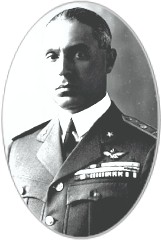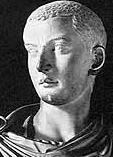|

JULY MEETING
DE PINEDO AND THE WINGS OF ITALY
|
 Italian Royal Air Force Colonel Francesco De Pinedo gained the distinction
of being the first foreign pilot to touch United States soil in a foreign
aircraft when he landed in New Orleans on March 29, 1927.
Italian Royal Air Force Colonel Francesco De Pinedo gained the distinction
of being the first foreign pilot to touch United States soil in a foreign
aircraft when he landed in New Orleans on March 29, 1927.
De Pinedo’s historic aerial voyage began in Italy and included
stops in Africa and both South and North America before returning home.
The trip covered over 27,000 miles and 4 continents with 44 stops en route
and was accomplished almost two months before Charles Lindbergh’s transatlantic
crossing. De Pinedo’s flagship was a Savoia-Marchetti SM55 seaplane
named Santa Maria in honor of Christopher Columbus. Like Columbus,
De Pinedo yearned to distinguish himself in the great tradition of Italian
explorers; unlike Columbus, however, De Pinedo’s accomplishments fell into
obscurity: seldom is his name even mentioned in the context of the
greatest aviators of all times, which undoubtedly he was.
Our speaker will be Franco Giannotti, an Italian
Air Force veteran who was involved in the preparations for the recent De
Pinedo 75th anniversary celebrations in Chicago and who will describe the
flight. He also gave a presentation on DePinedo at the June 2002
meeting of Italiano per piacere (IPP). About 1 1/2
years ago, Franco also spoke at IPP on the “Royal Italian Air Force”
with emphasis on Italo Balbo’s historic 24-plane Rome-Chicago-New York-Rome
flight. He is responsible for the Italy at St. Louis (www.italystl.com)
Internet portal for the Midwest, one of the largest Italian-American web
sites in the country. He is a member of the Italian Club, a board
member of the FIAO, and has held office in several other St. Louis Italian-American
organizations.
|
|
Next Meeting Wednesday, July 17, 2002
Cocktails 6:30 PM - Dinner 7:00 PM
Da Baldo's Restaurant
RSVP Marie Wehrle
(314) 544-8899
or by email
|

RECAP OF MAY MEETING
ANNUAL REPORT OF THE
HONORARY ITALIAN VICE CONSUL
|
| Since his 1997 appointment as Honorary Vice Consul in
St. Louis, Joseph Colagiovanni has spoken each year at the Club’s
June meeting, his reports having become an annual tradition. This
year’s presentation focused on three major topics: Italy’s economy
and the European Union (EU), Italy’s war on terror, and, briefly, Italy
and NATO.
The EURO conversion was approached with much trepidation
in Italy, but now, after some six months, the numerous rough spots have
smoothed and the new currency is well-accepted; however, the basic economic
issues associated with Italy’s participation in the EU remain and Prime
Minister Berlusconi, who enjoyed an unusually strong electoral mandate
based on his promise to continue progress in reforming and stabilizing
Italy’s economy, still finds improving the national economic situation
especially challenging. Italy still has the highest rate of unemployment
among industrialized nations combined with a relatively poor increase in
its productivity rate, factors contributing to a precarious condition of
public finance. Economic debates focus on four key areas: deregulation
of the labor market through better employee training, reduction in labor
strife, and emphasis on productivity improvement; increased privatization
to reduce government bureaucracy; reduction in public spending especially
in the difficult area of pension reform by moving to privately managed
pension funds (a situation mirroring current Social Security debate in
the United States); and, finally, reduction of certain illegal activities,
such as smuggling, done to avoid payment of license fees and taxes.
All of these factors are extremely important because they are directly
tied to EU budgetary rules. Mr. Berlusconi’s macro-economic policy
should be known in the next few weeks, when he submits his four-year economic
plan to Parliament. The major task will be to balance the budget,
which is to be accomplished by next year, a task that will require firm
action, especially on deficits, given revenue growth forecasts as low as
1.5 to 2.3 percent. All of this adds to Prime Minister Berlusconi’s
difficult political situation, since the Italian left made significant
gains against his center right coalition parties in the last general election.
The events of September 11 affected Italy significantly.
A number of the victims in the tragedy were Italian citizens and many suspected
terrorists had links to Italy. As a result, Italy has taken a number
of anti-terrorism steps: military presence was increased at airports
and more stringent visa requirements were established; a significant campaign
to learn more about individuals residing in Italy who might have links
to terrorist groups was initiated and currently at least 550 people are
being investigated for such ties; and finally the government has adopted
urgent measures (Law 438/2001) to prevent crimes committed for purposes
of international terrorism. This law introduces a new crime – conspiracy
to commit international terrorism – and provides for court-permitted preventive
wire-tapping and interception of communications in relation to crimes committed
in the pursuit of terrorism. Italy strongly supports the United Nations
anti-terrorism activities. The Government has already ratified 10
of the 12 UN anti-terrorism Conventions and submitted to Parliament the
draft Bills ratifying the Convention for Suppression of Terrorist Bombings
and the Convention for Suppression of the Financing of Terrorism, thereby
initiating the complete ratification of all UN treaties against terrorism.
Seven Tunisian citizens were recently convicted in Milan as members of
a terrorist cell accused of criminal possession of arms, explosives, chemical
material, false documents, and illegal entry. Also in Milan, eleven
Tunisian and Algerians, suspected of GIA affiliation (one also suspected
of links with Osama Bin Laden) are being prosecuted. In Rome, nine
Moroccan nationals have been arrested as suspects of a possible terrorist
chemical attack against the U.S. Embassy. Also in Rome, six people
are being prosecuted under the newly established article 270bis of the
Penal Code for having organized and participated in a cell linked to the
GIA and FIS organizations. Italy, a longstanding NATO member, continues
to participate actively in NATO operations. It will be interesting
to see the effect on Italy of significant moves made recently to expand
NATO by including several Central and Eastern European countries, many
Italy’s close neighbors, as well as the impact of a proposal to include
seven new admissions from the former Soviet Union – an expansion approved
by both Putin and President Bush.
Honorary Vice Consul Joseph Colagiovanni is a partner in
the law firm of Bryan, Cave, an adjunct faculty member of the Washington
University School of Law, and a member of the Italian Club of St. Louis.
|
|

L’ANGOLO DEL PRESIDENTE
By Gene Mariani |
 |
|
WELCOME NEW MEMBERS
|
We are pleased to announce that Victoria Pisani Millaway and
Dr.
Joseph Ippolito were elected members of the Italian Club at the June
19 meeting. Welcome to the Club, Victoria and Joseph.
|
NOMINATING
COMMITTEE APPOINTED
|
| In October, we will have our election for Club officers
(President, Vice President, Secretary, Treasurer) and one Director.
In accordance with our By-Laws, the President must appoint a committee
to recommend a proposed slate for election by the general membership.
The following members have been appointed to this committee: Joann
Arpiani, Marie Cuccia-Brand (Co-Chair), Roger Gennari,
Peter
Puleo (Co-Chair), Carolyn Stelzer, Vito Tamboli, and
Marie
Wehrle. In appointing this committee, I stressed that the group
should not hesitate to nominate any committee member deemed to be the best
candidate for any particular position.
If you are interested in being considered a candidate for
any office I encourage you to contact either Peter Puleo (993-1455) or
Marie Cuccia-Brand (993-2252).
|
|
|
|

|
ANNOUNCEMENTS
ITALIAN HERITAGE AWARD
|
 Member Marianne Peri-Sack was presented the Italian Club’s 2002
Italian Heritage Award at the June 19 meeting. The award is
given each year to an individual of Italian descent who has distinguished
him or herself for important and unselfish service to the Italian-American
community of St. Louis. Marianne is widely recognized throughout
the community for her articles and photographs in
Il Pensiero, the Italian-American newspaper of which she is the English
language editor. In addition, she has been very active in numerous community
organizations. She is currently President of the Misericordia Society,
an organization that her grandfather co-founded in 1920. She is also
the Vice President of the Sicilian Cultural Association and a member and
former director of the Italian Club of St. Louis. She is also a member
and prior board member of the St. Louis Chapter of UNICO; Vice President
of the Columbus Day Corporation; a board member of the Federation of Italian
American Organizations; and Secretary of the Hi-Pointe Food Pantry.
She is a graduate of the University of Missouri at St. Louis and a retiree
from the Boeing Corporation. Marianne was born and raised in St.
Louis. Her parents were the late Louis Peri and Josephine Maniscalco
Peri. She has one brother, Anthony Peri and is married
to Donald Sack.
Member Marianne Peri-Sack was presented the Italian Club’s 2002
Italian Heritage Award at the June 19 meeting. The award is
given each year to an individual of Italian descent who has distinguished
him or herself for important and unselfish service to the Italian-American
community of St. Louis. Marianne is widely recognized throughout
the community for her articles and photographs in
Il Pensiero, the Italian-American newspaper of which she is the English
language editor. In addition, she has been very active in numerous community
organizations. She is currently President of the Misericordia Society,
an organization that her grandfather co-founded in 1920. She is also
the Vice President of the Sicilian Cultural Association and a member and
former director of the Italian Club of St. Louis. She is also a member
and prior board member of the St. Louis Chapter of UNICO; Vice President
of the Columbus Day Corporation; a board member of the Federation of Italian
American Organizations; and Secretary of the Hi-Pointe Food Pantry.
She is a graduate of the University of Missouri at St. Louis and a retiree
from the Boeing Corporation. Marianne was born and raised in St.
Louis. Her parents were the late Louis Peri and Josephine Maniscalco
Peri. She has one brother, Anthony Peri and is married
to Donald Sack.
|
|

CONGRATULATIONS
|

Congratulations, Armando and Evelina Pasetti
and your
entire family for the tremendous accomplishments of the Volpi Foods Company,
which celebrates its 100th anniversary this year.
And molte grazie for the wonderful times and delicious
food which we all can experience because of your efforts.
|
|

MRS. AGNES COPPI
|
On behalf of the Italian Club, we wish to extend our sympathy
and condolences to Assunta Coppi Della Croce, wife of member Aldo
Della Croce, and their daughter Danielle on the death of Assunta’s
mother, Agnes Coppi on June 11, 2002.
|
|

DON’T MISS DARK EYES AT THE
SAINT LOUIS
ART MUSEUM ON JULY 12
|
Show your support for the Club in its efforts to bring
classic Italian films to Saint Louis by attending the showing of the rare
film Dark Eyes with Marcello Mastroianni on Friday July 12 at 7:30
PM at The Saint Louis Art Museum Auditorium in a program sponsored jointly
by the Italian Club and the Museum. Beautifully filmed in Italy and
Russia, the great Marcello won prestigious awards for his performance in
this masterpiece. In Italian and Russian with English subtitles.
Introduction by Italian Club member, Dorotea Rossomanno-Phillips.
Tickets are $5 general admission, $4 for members of The Saint Louis
Art Museum or the Italian Club of St. Louis and may be purchased at the
door. |
|

FRANCESCO DE PINEDO
PHOTO EXHIBIT AND RECEPTION
AT MUSEUM OF TRANSPORTATION |
 An exhibition of 53 original photographs of the 1927 flight of Royal Italian
Air Force Colonel Francesco DePinedo is currently at the St. Louis Museum
of Transportation in Kirkwood and will continue through July 14.
The exhibit portrays details of one of the longest and most daring air
achievements of the era, covering 27,250 miles and 4 continents with 44
stops. On July 14 at 4:30 pm, a narrated tour of the exhibit will
be provided by member Franco Giannotti, followed by a reception and
refreshments. All members are invited to attend. The Museum
is located at 3015 Barrett Station Road, West of I-270 and south of Dougherty
Ferry Rd
An exhibition of 53 original photographs of the 1927 flight of Royal Italian
Air Force Colonel Francesco DePinedo is currently at the St. Louis Museum
of Transportation in Kirkwood and will continue through July 14.
The exhibit portrays details of one of the longest and most daring air
achievements of the era, covering 27,250 miles and 4 continents with 44
stops. On July 14 at 4:30 pm, a narrated tour of the exhibit will
be provided by member Franco Giannotti, followed by a reception and
refreshments. All members are invited to attend. The Museum
is located at 3015 Barrett Station Road, West of I-270 and south of Dougherty
Ferry Rd
.    |
|

ITALIAN OPERA - IN ITALIAN
AT UNION AVENUE OPERA THEATRE |
Union Avenue Opera Theatre (UAOT) will present Verdi’s
beloved La Traviata on July 12,13,19 and 20. Patricia
Andress, Brent Billock, and Gustavo Ahualli make their UAOT debut as Violetta,
Alfredo and Giorgio. All three come to UAOT with extensive performance
experience. UAOT veterans Joy Boland, Patrick Hogan, Mark Kent and
Deborah Stinson join Scott Levin, Jeffrey Miller and Jermaine Smith to
complete the cast. The Ensemble, Doug Allebach, Jenna Anderson, Shannon
Caprogreco, Laura Case, Diane Dietz, Rose Marie Fischer, Clifton Hardy,
James Harkey, Michael Kramer, Tamara Miller-Campbell, Sharon Nathason,
Paul Provencio, and Terree Rowbottom is comprised of singers from St. Louis
and Southern Illinois.
Stage director Brian Luedloff joins UAOT for his first
season. His background includes directing operas in New York and
Boston as well as throughout the Midwest, including Opera Theatre of St.
Louis. Scott Schoonover, UAOT Artistic Director and founder of Union
Avenue Opera Theatre, will conduct.
All performances are fully staged and performed in Italian with projected
translations.
Puccini’s masterpiece Tosca will be performed
on August 16, 17, 23, and 24. Audio Description services will be
provided for the July 12 and August 16 performances. Dr. Glen Bauer,
Director of Music History and Literature at Webster University, will give
a pre-concert program at 7 PM on the opening night of both operas.
All performances begin at 8 PM at Union Avenue Christian
Church, 733 North Union Blvd., St. Louis, MO 63108. Center Front
tickets are $25. General Admission tickets are $20 and tickets for
students and seniors are $18. Doors open at 7:15 PM. For more
information call 314-361-2881 or e-mail uaot@juno.com.
|
|

The Italian Club of St. Louis
|
|
|
|


| I capolavori della poesia italiana
Clemente Rebora (Milano 1885 – Stresa 1957) combatté
durante la prima guerra mondiale (’15-’18) da cui ritornò con un
grave trauma nervoso. Nel 1929 si convertì al cattolicesimo
e nel 1936 fu ordinato sacerdote presso l’Istituto della Carità
di Domodossola.
Serenata di grilli invita a ridimensionare il proprio ruolo
su un piano universale trovando un accordo tra la voce individuale dell’anima
e quella corale del mondo.
Serenata di grilli
di Clemente Rebora
O dei grilli in cadenza solitaria
ai poggi senza stelle
dentro il bagnato alitare dell’aria
tenui serenatelle!
Cos’è la vita con sue rabbie a voi
persi nei solchi fuori
all’ombra inerte, o di silenzi a noi
dolcissimi cantori?
Anima, intona la tua voce e nulla
non domandare più:
càntati la canzone della culla
mentre declini giù.
|
|
| (Continua dal numero precedente)
 Gordiano
III (225 – 244) (Imperatore 238-244). Dopo la morte di Massimino ad
Aquileia, Gordiano III diviene dunque l’incontestato imperatore con l’appoggio
sia del senato che dei soldati. Il reggente è Furio Sabinio
Aquila Timetiseo, uomo di provata abilità e rettitudine. Nel
241 Gordiano III sposa Sabina Tranquillina, figlia di Timesiteo, e nomina
il suocero prefetto del pretorio. Ma né l’imperatore né
Timetiseo hanno tempo da dedicare alla attività legislative perché
il nemico incalza ai confini dell’impero: in Persia i Sasanidi guidati
da Shapur (Sapore), che nel 240 era successo al padre Ardeschir, erano
penetrati nella Siria e minacciavano Antiochia; sul Danubio i Goti avevano
saccheggiato la città di Istro; e più ad occidente i Carpi
erano in rivolta. Nel 242 Gordiano va in Oriente dove sconfigge i
Sasanidi a Resaina mentre Timesiteo si dirige verso il nord, dove sconfigge
i Carpi e i Goti. Gordiano
III (225 – 244) (Imperatore 238-244). Dopo la morte di Massimino ad
Aquileia, Gordiano III diviene dunque l’incontestato imperatore con l’appoggio
sia del senato che dei soldati. Il reggente è Furio Sabinio
Aquila Timetiseo, uomo di provata abilità e rettitudine. Nel
241 Gordiano III sposa Sabina Tranquillina, figlia di Timesiteo, e nomina
il suocero prefetto del pretorio. Ma né l’imperatore né
Timetiseo hanno tempo da dedicare alla attività legislative perché
il nemico incalza ai confini dell’impero: in Persia i Sasanidi guidati
da Shapur (Sapore), che nel 240 era successo al padre Ardeschir, erano
penetrati nella Siria e minacciavano Antiochia; sul Danubio i Goti avevano
saccheggiato la città di Istro; e più ad occidente i Carpi
erano in rivolta. Nel 242 Gordiano va in Oriente dove sconfigge i
Sasanidi a Resaina mentre Timesiteo si dirige verso il nord, dove sconfigge
i Carpi e i Goti.
Gordiano, riconoscente verso il suocero, chiede al senato
di dare festeggiamenti in suo onore e sacrifici di ringraziamento agli
dei, ma sfortunatamente nel 243 il valoroso prefetto muore di malattia
a Chaboras.
Al suo posto viene scelto M. Giulio Filippo (il futuro
imperatore Filippo Arabo), che si era conquistato il rispetto dei soldati.
A questo punto le versioni degli avvenimenti variano.
Secondo la fonte persiana, nel 244 l’esercito imperiale con a capo Filippo
si scontra di nuovo con i Sasanidi, ma questa volta Shapur vince.
In onore della sua vittoria viene eretto un monumento commemorativo che
in tre lingue proclama che Gordiano III è stato ucciso in questa
battaglia a Misiche, vicino a Bagdad. Le fonti romane invece non
parlano di questa battaglia e accusano Filippo di aver causato la morte
di Gordiano. Secondo questa versione, Filippo aveva provocato il
malcontento delle truppe, togliendo loro i viveri, per far ricadere la
colpa sull’inesperienza di Gordiano che fu perciò ucciso nel 244
a Zaita, presso Circesio, sull’Eufrate.
 Filippo
Arabo (201-249) (Imperatore 244- 249). Morto Gordiano, le legioni
acclamano imperatore Filippo, il quale comunica al senato che Gordiano
III è morto di malattia. Il Senato erige un mausoleo in suo
onore e ratifica la nomina di Filippo. Filippo
Arabo (201-249) (Imperatore 244- 249). Morto Gordiano, le legioni
acclamano imperatore Filippo, il quale comunica al senato che Gordiano
III è morto di malattia. Il Senato erige un mausoleo in suo
onore e ratifica la nomina di Filippo.
Filippo era nato nel villaggio di Shaba, vicino a Damasco,
villaggio a cui, una volta imperatore, Filippo diede il nome di Filippopoli.
Nel 230 aveva sposato Marcia Otacilia Severa e da lei aveva avuto un figlio,
Marco Giulio Severo Filippo. Sia Filippo che il fratello Gaio Giulio
Prisco avevano servito come prefetti sotto Gordiano III.
Filippo aveva fretta di tornare a Roma temendo che altri
potessero ambire al suo titolo, perciò per prima cosa si accinse
a far pace con i Sasanidi. Come aveva fatto l’imperatore Macrino
nel 218, Filippo riuscì nel suo intento elargendo grandi somme di
denaro, anche lui suscitando il malcontento delle truppe.
Una volta a Roma, Filippo celebra la vittoria contro i Sasanidi e si
affretta a circondarsi da persone a lui leali: al fratello Gaio Giulio
Prisco dà la Mesopotamia, al cognato Severiano la Mesia, al figlio
di sei anni il titolo di Cesare ed alla moglie quello di Augusta.
Ma a Roma non rimane che brevemente perché nel 245deve
recarsi in Dacia, che è di nuovo stata invasa dai Carpi ed altre
tribù Germaniche. Dopo due anni di guerra sul Danubio, riesce
a sottomettere gli invasori e nel 247 torna a Roma per celebrarne il millenario
della fondazione con grandi fasti. Infatti, benché il calendario
giuliano fosse in vigore dai tempi di Giulio Cesare, veniva osservato anche
il calendario Romano vigente dai tempi di Numa, secondo il quale il 21
aprile veniva celebrato il millennio della città di Roma.
Ma il 248 segna un anno difficile per Filippo: è
l’anno in cui molte ribellioni si susseguono in vari luoghi dell’impero
sobillate da vari ribelli: Silbannaco sul Reno, Sponsiano e Pacatiano
sul Danubio, Giotapiano nella Siria, Marino nella Mesia.
Filippo è allarmato da queste notizie e offre le dimissioni,
ma il senatore Gaio Messio Quinto Decio rassicura il senato dicendo che
i ribelli non dureranno molto e finiranno uccisi dai loro ldati.
Una profezia che naturalmente si avvera.
Tuttavia la situazione sul Danubio rimane critica e richiede
l’intervento di Filippo, che manda Decio a governare la Mesia e la Pannonia.
Decio ristabilisce l’ordine in poco tempo, guadagnandosi il rispetto dei
soldati che lo proclamano imperatore nel 249. Inutilmente Decio protesta
di non volere il titolo; Filippo non gli crede e muove il suo esercito
contro di lui, non lasciandogli perciò altra scelta che quella di
difendersi.
I due eserciti si scontrano presso Verona, dove Filippo
è sconfitto ed ucciso insieme al figlio dodicenne.
Un elemento nella vita di Filippo Arabo che ha ricevuto
molta attenzione è la sua religione: infatti, 75 anni dopo
la sua morte, Eusebio e altri cristiani avevano sparso la voce che Filippo
fosse stato un cristiano lui stesso. Pare invece che non si possa
dare alcun affidamento a questa credenza, forse dovuta alla sua tolleranza
religiosa, perché non fu mai corroborata da scrittori non cristiani.
(continua al prossimo numero)
|

|
|